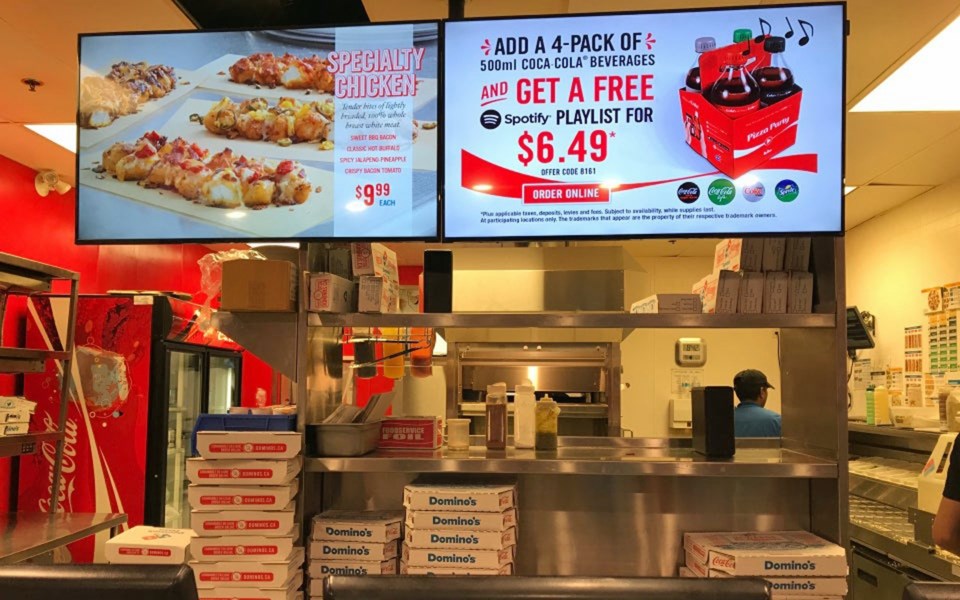five former employees of a Whistler Domino's franchise have been paid $10,486 in owed wages and vacation pay in a labour case that centred around the delivery drivers' contractual status. The franchisee was also fined $2,500.
In May, the B.C. Employment Standards Branch (ESB) ruled in favour of the former staff, finding that Domino's owner Gary Josefczyk had contravened the Employment Standards Act over owed wages, overtime, statutory holiday pay and annual vacation pay.
When the complaint was first filed in 2017, trade union Unifor, which assisted the Domino's employees, said Josefczyk voluntarily paid $8,942 to settle the complaints—before it was determined the workers were owed another $1,544 in wages after additional payroll documents were obtained.
According to the ESB's determination, prior to the spring of 2017, Georgia Pizza Inc., carrying on business as Domino's Pizza Whistler, treated its drivers as independent contractors, paying rates between $8.50 and $11 an hour, depending on the individual arrangement. (B.C.'s minimum wage at the time was $10.85/hr.) The ESB, however, ruled that the drivers' were dependent contractors and, as such, should be considered full employees eligible for minimum wage and holiday pay.
"Georgia Pizza had control and direction of their drivers and remunerated the drivers for their work on an hourly basis," ESB delegate Sarah Beth Hutchinson wrote in her determination. "The drivers were not in business for themselves, and did not submit invoices. The answer to 'whose business is it,' is Georgia Pizza. I find that the definition of employer applies to Georgia Pizza and the Complainants were employees of Georgia Pizza, and subject to the jurisdiction of the Act."
Speaking with Pique, Josefczyk said that a previous ruling against another Domino's franchisee prompted him to bring his delivery drivers onto the payroll as employees, a move he said several of the drivers' lobbied against. He claimed it was a week later when he learned of the drivers' complaint to the ESB.
"Three of the five complainants chose not to go on payroll, but to take me to [the Employment Standards Branch] saying I wasn't complying," he said. "I'm like, 'Well, that's kind of a slap in the face.'"
The ESB's ruling acknowledged the drivers "preferred the flexibility of the arrangement, as well as being paid nightly," but that ultimately, the drivers' desire to remain on as independent contractors was irrelevant.
"It is well established that the parties' intentions is not conclusive to establishing whether or not the parties are subject to the Act," the ruling stated.
The contractual status of delivery drivers remains a hot-button issue across Canada. Ride-hailing apps such as Uber, Lyft, as well as some food-delivery services treat their drivers as independent contractors, excluding them from basic protections under employment law, such as minimum wage, anti-discrimination law and the power to collectively bargain.
It's led to calls from Unifor for a widespread investigation into the delivery industry—including pizza chains such as Domino's.
"All of these have a common thread: They're Domino's," said Unifor's Murray Gore, who assisted the Whistler Domino's employees with their case. "These people who run pizza franchises, I'm not sure if they are getting direction from the franchise name-holder. It sounds to me there's a playbook that comes out and everybody plays by it."
(A request for comment from Domino's Pizza Canada's head office was not returned by deadline.)
In late 2018, the Ontario Ministry of Labour ordered a Mississauga Domino's franchisee to pay delivery driver Juan Jose Lira Cervantes more than $25,000 in lost pay and benefits after his boss had refused to pay him minimum wage for roughly four years. As of July 2019, the franchisee still owed Cervantes nearly $20,000, money he is now unlikely to recoup; the franchise dissolved shortly after the ministry ruled in Cervantes' favour.
Under the B.C. Liberals, investigations into labour practices were largely complaint-driven, something the NDP has vowed to amend, said Gavin McGarrigle, Unifor's B.C. area director.
"This is an example of when you see smoke, you have to go in and investigate," he said. "This particular owner owns multiple Domino's franchises and we're stuck trying to help these non-union workers on a case-by-case, claim-by-claim basis with a limitation of six months of liability, and nobody from [the ESB] is interested in saying, 'Hey, let's have a look at this guy's business practices everywhere, and in fact, maybe we should pay more attention to what's going on in this industry.'"
Two Whistler pizzerias Pique reached out to said their delivery drivers are treated as full employees, while a third said that independent contractors were only used intermittently during busy periods, while their year-round drivers are considered employees.




